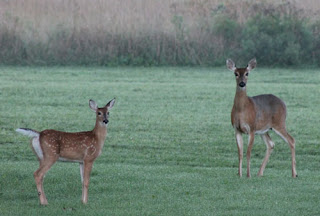In spite of the continuing hot, humid weather, there are
signs that we are move inexorably toward autumn. The end of summer is a
melancholy time for me. The bean seedlings that I carefully thinned and
nurtured not very long ago are brown and leafless as I, with sweat sticking my
t-shirt to my back, pull them from the ground and strip the dried pods. Yet I
can look forward to putting on my warm, fuzzy sweatshirt and making chili and
bean soup.
Pat, Nancy, and Jane came up last Sunday for sauerkraut
making. . Before
they arrived, I got our 3-gallon crock out of the root cellar and washed it.
This is not a small object, and I had to laugh when I saw this informational
label on the bottom: "Conventional oven, Microwave oven, and Dishwasher safe."
 |
| And how big is your microwave? |
Many hands did, in fact, make light work. We were all done in an hour. There
were several factors in this record time. First, we intentionally planted fewer
cabbages this year because we made far more sauerkraut last year than we
needed, pawning all the excess off on my brother as recently as the day before
we made the new batch.
 |
| Six Danish Ballhead cabbages ready for processing |
Second, I knew exactly where the sauerkraut cutter was,
which saved us all that time we spent last year looking for it. Third, Jane
joined the party, which made the whole process that much more efficient. Jane
cleaned the cabbages and Nancy quartered them. They also both thinly sliced the
stray leaves that fell off the cabbage heads as I ran them through the slicer.
 |
| Nancy quarters the cabbages while I, wearing a protective glove, slice them |
Hilda weighed out half-pound increments (all that fits on
the scale) and counted to five (2.5 pounds per batch). Pat added the salt,
mixed, and mashed the sauerkraut into the crocks. Jane also acted as
photographer, which is why she isn’t in any of the pictures.
 |
| Hilda weighs and Pat mixes in the salt |
We were lucky to get 1.6” of rain over the two days prior to
sauerkraut making. The extra hydration in the cabbage meant that the sauerkraut
juiced up nicely. Some years, it is a struggle to keep the cabbage submerged,
but this year there’s a good two inches of brine on top. (It is essential to
keep the cabbage under a layer of brine because it will rot if exposed to air. Decomposition
is aerobic. Fermentation is anaerobic. Chapter 8.)
The end of summer also brings us raspberries. I made a
raspberry pie for Sauerkraut Day by putting a bunch (when you don’t have to buy
them in the store, quantities don’t matter so much) of raspberries through the
food mill and thickening the resulting 1.25 cups of puree (with some water and ¼
cup sugar) with corn starch. After it cooled a little, I tossed in a quart of
whole raspberries and put it in a baked pie crust.
 |
| Raspberry filling in baked pie crust |
Which I then topped with whipped cream just before serving.
 |
| The final presentation, topped with whipped cream |
 |
| Individual serving |
The oaks have dropped a prodigious number of acorns this
year. It makes for a bumpy ride on the mower, let me tell you. We often get
rafters of turkeys eating the acorns, but this year we have twin fawns and
their mom coming around early in the morning. Unfortunately, they don’t all
pose together for photos. Here are the twins, still spotted.
 |
| The twins foraging for acorns under the fifth oak |
As soon as I stepped out of the house for a better picture,
Mama came over to see what was going on. Shortly after that, they all took off
for the field, white tails in the air.
 |
| Mama comes over to see what's going on |
No comments:
Post a Comment